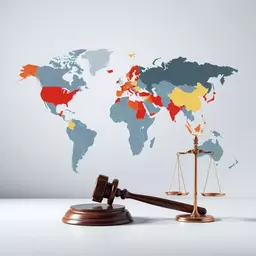Understanding Red Notices Simplified

In today's interconnected world, understanding the nuances of international law is more crucial than ever, especially when it involves complex legal instruments like Red Notices. As globalization increases, so do the challenges faced by individuals accused of crimes that transcend borders. Navigating these waters requires clarity and insight.
What You Will Learn
- Red Notices Explained: Learn that a Red Notice is an INTERPOL request for cooperation, not an arrest warrant, aimed at locating wanted persons.
- Legal Distinctions: Understand the difference between Red Notices and international arrest warrants, including their authority, power, and scope.
- Issuance Process: Recognize how Red Notices are formally requested by member countries based on valid legal grounds.
- International Cooperation: Discover the significance of Red Notices in facilitating global collaboration against transnational crime while respecting human rights.
- Legal Obligations: Be aware that countries may have varying obligations to act on Red Notices based on their national laws and treaties.
- Staying Informed: Learn the importance of understanding your rights and the legal landscape surrounding Red Notices for effective defense strategies.
- Proactive Steps: Identify immediate actions to take if facing a Red Notice, including seeking legal counsel and staying updated on legal developments.
Key Aspects and Differences of Red Notices and International Arrest Warrants
Understanding the distinctions between Red Notices and International Arrest Warrants is crucial in navigating international law. Below is a visual representation of their key features.
Red Notices
- Purpose: Alerts member countries of wanted persons.
- Legal Status: Does not compel extradition.
- Issuance: Based on requests from member countries.
- Global Reach: Circulated to all INTERPOL member nations.
International Arrest Warrants
- Authority: Issued by national courts.
- Legal Power: Can lead to immediate detention.
- Scope: Specific to one country.
Defining Red Notices: A Clear Understanding of Their Purpose
When discussing international law, one term that comes up frequently is the Red Notice. But what exactly is a Red Notice? In simple terms, it is a request issued by INTERPOL to law enforcement worldwide, asking for the location and arrest of a wanted person. For individuals navigating the complexities of extradition law, like those who reach out to us at Extradition Interpol UAE, understanding the purpose of these notices is crucial.
Red Notices serve several significant functions in international law. They help ensure that individuals accused of serious crimes cannot evade justice by crossing borders. Moreover, they facilitate cooperation between countries, allowing for a more effective response to transnational crime. Recognizing the importance of these notices is a vital step for anyone facing potential extradition or legal challenges.
What Are Red Notices and Their Significance in International Law?
Red Notices are not arrest warrants; instead, they act as alerts to law enforcement agencies about a person wanted for prosecution or to serve a sentence. This means they serve as a valuable tool for countries to collaborate on legal matters. The significance of Red Notices lies in their ability to bring international attention to wanted individuals, which can ultimately lead to their arrest and extradition. For those facing such notices, understanding legal defense strategies is paramount.
Here’s a quick breakdown of the key aspects of Red Notices:
- Purpose: To inform member countries about wanted persons.
- Legal Status: They do not compel extradition but assist in locating individuals.
- Issuance: Red Notices are issued following a formal request from a member country.
- Global Reach: They are circulated to all INTERPOL member nations, enhancing international cooperation.
The Difference Between Red Notices and International Arrest Warrants
While both Red Notices and international arrest warrants aim to locate and apprehend individuals, they are not the same. An international arrest warrant is a legal document issued by a country's judicial system that mandates arrest. In contrast, a Red Notice is merely a request for cooperation.
Let’s clarify the distinctions further:
- Authority: Arrest warrants are issued by national courts; Red Notices come from INTERPOL.
- Legal Power: Arrest warrants can lead to immediate detention; Red Notices notify but do not enforce.
- Scope: Arrest warrants are specific to one country; Red Notices are shared globally.
Understanding these differences is crucial, especially if you or someone you know is in the crosshairs of international law. Misunderstanding either could lead to unnecessary complications. At Extradition Interpol UAE, we aim to clarify these concepts so individuals can better navigate their legal landscapes.
Pro Tip
When dealing with a Red Notice, always document all communications with law enforcement and legal representatives. This helps create a clear record of your situation and can be invaluable if you need to challenge the notice or seek legal recourse.
Summarizing Key Points on Red Notices and Their Legal Process
As we wrap up our discussion on **Red Notices**, it’s essential to summarize the key points covered. We have explored their purpose, the intricacies of the legal process, and the implications for individuals involved. Understanding these aspects is vital for anyone facing the complexities of international law.
The legal landscape surrounding Red Notices involves multiple layers, from how they are issued to the role of INTERPOL. Individuals must recognize that a Red Notice is not an arrest warrant, but rather an alert to law enforcement worldwide about a wanted person. This distinction is crucial as one navigates the potential for extradition and the legal ramifications involved. For further insights, consider the importance of responding to an Interpol Red Notice effectively.
Recap of the Legal Process and Implications of Red Notices
To further clarify the legal process regarding Red Notices, let’s recap the key elements:
- Issuance Process: Red Notices are formally requested through INTERPOL by member countries based on valid arrest warrants or legal charges.
- Role of INTERPOL: They facilitate communication and ensure that notices adhere to international law while respecting human rights.
- Extradition Treaties: These treaties dictate how Red Notices are enforced, with significant variation between jurisdictions.
- Legal Obligations: Countries receiving a Red Notice may have to act upon it, but compliance is subject to their national laws and policies.
These points underscore the importance of understanding your rights and legal options if you find yourself facing a Red Notice. At Extradition Interpol UAE, we aim to provide you with the support and insights necessary to navigate this challenging landscape.
Contact Information for Legal Resources and INTERPOL Guidance
If you or someone you know is dealing with a Red Notice, reaching out for legal assistance is critical. Here’s how you can find help:
- Consult Legal Experts: Engage with lawyers who specialize in extradition and international law.
- INTERPOL Resources: Visit the official INTERPOL website for guidelines and contacts related to Red Notices.
- Stay Informed: Keep updated with legal news and changes in international extradition laws.
Being proactive and informed can greatly influence the outcome of your situation, so don't hesitate to seek out resources that can help illuminate your path forward.
Encouraging Informed Action and Further Learning
As we conclude, I encourage everyone to prioritize staying informed about the legal processes involving Red Notices. The more you know, the better equipped you will be to address any legal challenges that arise. Remember, knowledge truly is power!
Importance of Staying Informed about Legal Processes Involving Red Notices
Understanding the laws and procedures surrounding Red Notices can prevent misunderstandings and aid in strategic decision-making. Here are some reasons why staying informed is crucial:
- Awareness: Knowing your rights helps in advocating for yourself effectively.
- Preparation: Understanding the legal framework can aid in formulating a defense strategy.
- Networking: Engaging with legal professionals enhances your support system.
For those facing or anticipating legal challenges related to Red Notices, being knowledgeable empowers you to take action and seek appropriate legal counsel swiftly.
Next Steps for Readers: Seeking Advice and Further Understanding
If you find yourself in a situation involving a Red Notice, the next steps are crucial. Here’s what I recommend:
- Seek immediate legal advice from a qualified attorney.
- Research your specific situation regarding the Red Notice and its implications.
- Connect with support groups or online forums to share experiences and strategies.
At Extradition Interpol UAE, we’re here to support you in your journey. You don’t have to navigate this alone!
Before exploring international cooperation, it's helpful to understand Extradition Laws in the UAE. This knowledge will give you a solid foundation for understanding the complexities of international law and how different countries interact legally.
Understanding International Cooperation in Criminal Justice
Lastly, it's essential to grasp the bigger picture of how international cooperation plays a role in criminal justice, particularly regarding extradition and Red Notices. Countries work together to ensure justice is served while balancing human rights considerations:
- Mutual Legal Assistance: Countries collaborate to share information and evidence.
- Respect for Human Rights: Legal frameworks often include protections to prevent abuse.
- Variability in Laws: Each country has unique laws that can affect the enforcement of Red Notices.
This cooperation is fundamental for maintaining global security and justice, and it highlights the importance of having knowledgeable advocates—like those at Extradition Interpol UAE—on your side. Stay informed, ask questions, and don’t hesitate to reach out for help!
Recap of Key Points
Here is a quick recap of the important points discussed in the article:
- Definition: A Red Notice is a request by INTERPOL to locate and provisionally arrest a wanted person, not an arrest warrant.
- Purpose: Red Notices serve to facilitate international cooperation against transnational crime and ensure individuals cannot evade justice across borders.
- Legal Distinction: Unlike international arrest warrants, Red Notices do not compel extradition but serve as alerts for law enforcement agencies worldwide.
- Issuance Process: They are issued based on formal requests from member countries, typically following valid legal charges.
- Role of INTERPOL: INTERPOL ensures that notices adhere to international law and respect human rights, enhancing legal cooperation globally.
- Legal Obligations: Countries receiving a Red Notice may have obligations to act, but compliance varies based on national laws.
- Importance of Legal Counsel: Seeking advice from legal experts is crucial for individuals facing a Red Notice to navigate the complexities of international law effectively.



